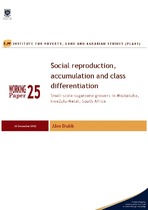Social reproduction, accumulation and class differentiation: Small-scale sugarcane growers in Mtubatuba, KwaZulu-Natal, South Africa
Abstract
This paper argues that the rise and decline of small-scale sugarcane grower (SSG) production in
KwaZulu-Natal must be historically located within a changing structural relationship with
miller-processors, in turn conditioned by shifts in regulatory frameworks. Critically, the
emergence of SSG production in the late-1970s–1980s can be traced to industry-subsidised
initiatives disguised as micro-credit which brought commercially inalienable Bantustan land
into cane production with strong miller oversight. From the late 1980–1990s, however, the
elimination of these subsidies encouraged millers to withdraw from direct oversight and to
subcontract support to farmers, while simultaneously instigating an increase in SSG numbers by
removing restrictions on grower registration. Enduring drought must certainly be understood
as a central proximal factor in the rapid decline of SSGs, but their rapid increase in the first place
was structurally fragile. This paper further strives to provide insight into the shifting class
dynamics of SSGs under constrained conditions of production, utilising survey data from
seventy SSG homesteads and life-history interviews in two rural wards of the Umfolozi region.
Although proceeds from sugarcane have represented an important source of cash-income for
homesteads, deteriorating terms of exchange and barriers to expansion in land and capital have
placed a greater emphasis on sparse off-farm income opportunities for stabilising consumption
and enabling limited re-investment in production. The centrality of income-diversification for
simple reproduction and limited accumulation has rendered the dynamics of social
differentiation both unstable and reversible. The paper concludes by exploring the implications
for agrarian reform policy.

